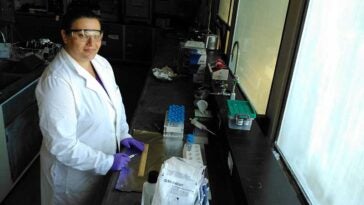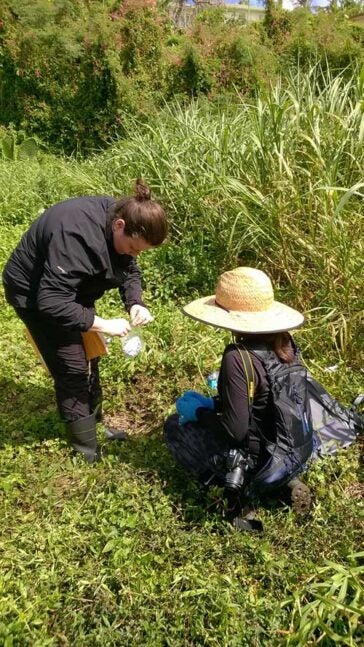 “Coming here and starting with STEEP, it was really a family…people who were enthusiastic about the work we started doing…this was for me.”
“Coming here and starting with STEEP, it was really a family…people who were enthusiastic about the work we started doing…this was for me.”
In November 2022, former STEEP trainee Jitka Becanova, PhD, began her new position as Assistant Research Professor at the University of Rhode Island Graduate School of Oceanography, adding to her already impressive work as senior personnel in STEEP Project 4 (Detection Tools), an analytical lead in the DMAC core, and mentor for the RETCC core. An environmental chemist, Becanova has integrated her expertise in analytical chemistry with environmental engineering; her goal is to identify the presence of compounds of concern in the environment and help reduce human exposure.
Becanova joined STEEP in 2017 as a postdoctoral fellow under STEEP Director Rainer Lohmann, PhD, where her research explored tools assessing PFAS environmental behavior and fate in various environmental matrices, distributions of PFAS in water, sediment and air, and properties crucial for understanding transport between environmental conditions. “She is like the ‘engine’ of STEEP that keeps the research wing going,” Asta Habtemichael, STEEP trainee in the Lohmann Lab.
 In 2018, Becanova was awarded the KC Donnelly Externship Award to establish transdisciplinary research in a quickly developing field of nanomaterials environmental applications. She was granted a fellowship in the Brown University Laboratory for Environmental and Health Nanoscience, with Robert Hurt, PhD, which provided an access to cutting-edge research in the field of nanomaterials, synthesis, and characteristics. Her work was incorporated into a further collaboration between STEEP and Hurt’s lab, resulting in two funded awards (Development and Field-Testing of Advanced Passive Samplers for PFAS), multiple presentations at scientific conferences, and a publication in Environmental Science: Nano.
In 2018, Becanova was awarded the KC Donnelly Externship Award to establish transdisciplinary research in a quickly developing field of nanomaterials environmental applications. She was granted a fellowship in the Brown University Laboratory for Environmental and Health Nanoscience, with Robert Hurt, PhD, which provided an access to cutting-edge research in the field of nanomaterials, synthesis, and characteristics. Her work was incorporated into a further collaboration between STEEP and Hurt’s lab, resulting in two funded awards (Development and Field-Testing of Advanced Passive Samplers for PFAS), multiple presentations at scientific conferences, and a publication in Environmental Science: Nano.
Additionally, Becanova co-led other projects focused on the development of new PFAS sampling techniques with potential for PFAS remediation, working across disciplines within STEEP project (Project 1: Environmental Fate and Transport, Elsie Sunderland, PhD; Project 3: Metabolic Effects, Angela Slitt, PhD) and developing a portfolio of sensitive analytical methods quantifying trace concentration of PFAS in biological samples of limited sizes, outlined in four peer-reviewed papers.
“It is important to have a broader mentor group…people have different backgrounds, different expertise, different personalities,” Becanova says, “…which might help you better navigate through the grad school, and maybe help you choose your future path in life.”
She has collaborated with colleagues from URI College of Engineering and Graduate School of Oceanography, other universities including Arizona State University and Technical University of Liberec, governmental agencies (EPA, USGS) and internationally, with the French National Institute for Industrial Environment and Risks and the Czech Academy of Sciences. Collaboration has led to three successful awards, two in review, and a joint publication with the USGS (in press).
“Having access to not just one world-renowned PFAS scientist (Lohmann), but two, with Jitka, has made all the difference in my graduate education. Being able to run every method or project idea by one of the best analytical minds in the PFAS world has been an unquantifiable advantage to me.”
-Matthew Dunn, STEEP trainee
Close to home, Becanova has become an inspiration to all of STEEP, quickly becoming integral to work with DMAC and as a support system for graduate students in the training core. “Jitka has been a vital part of my growth as a scientist … she has been both an amazing mentor and friend to me,” says Melissa Woodward, STEEP trainee. And according to Jared Snook, another STEEP trainee in the Lohmann Lab, “Jitka is a true expert in the field, and one of the most influential and enjoyable mentor figures I have worked with.”
“Jitka has been a tremendous resource for trainees to help with analytical issues, troubleshooting instrumental and method problems while also developing her own research profile on PFAS detection tools…and also bridging some European research into novel biological sorbents to include in STEEP’s activities,” says Rainer Lohmann, PhD. “She has become an asset to STEEP’s operations, connecting trainee activities with data management and furthering her own research into the detection, transformation and remediation of PFAS.”
Since joining STEEP in 2017, Becanova has collaborated on 12 peer-reviewed papers (nine published, one in press, and two in revision), presented research at 13 national and international conferences, and has been engaged as a technical speaker for several advisory groups. Prior to her work with STEEP, Becanova earned a degree in Environmental Engineering Technology/Environmental Technology from Brno University of Technology, and a PhD in Environmental Analytical Chemistry from Masaryk University.
Publications
- Dunn M, Becanova J, Snook J, Ruyle BJ, Lohmann R. 2023. Calibration of perfluorinated alkyl acid uptake rates by a tube passive sampler in water. ACS ES&T Wat 3(2):332-341. doi:10.1021/acsestwater.2c00384
- Gardiner C, Robuck AR, Becanova J, Cantwell MG, Kaserzon S, Katz D, Mueller JF, Lohmann R. 2022. Field validation of a novel passive sampler for dissolved PFAS in surface waters. Environ Toxicol Chem doi:10.1002/etc.5431
- Morales-McDevitt ME, Dunn M, Habib A, Vojta S, Becanova J, Lohmann R. 2022. Poly- and Perfluorinated Alkyl Substances in Air and Water from Dhaka, Bangladesh. Environ Toxicol Chem, 41: 334-342. https://doi.org/10.1002/etc.5255
- Morales-McDevitt ME, Becanova J, Blum A, Bruton T, Vojta S, Woodward M, and Lohmann R. 2021. Environ Sci & Technol Letters 8(10): 897-902. doi:10.1021/acs.estlett.1c00481
- Pickard HM, Ruyle BJ, Thackray CP, Chovancova A, Dassuncao C, Becanova J, Vojta S, Lohmann R, Sunderland E. 2022. PFAS and precursor bioaccumulation in freshwater recreational fish: implications for fish advisories. Environ Sci Technol 56(22):15573-15583. doi:10.1021/acs.est.2c03734
- Marques ES, Agudelo J, Kaye EM, Modaresi SMS, Pfohl M, Bečanová J, Wei W, Polunas M, Goedken M, Slitt AL. 2021. The role of maternal high fat diet on mouse pup metabolic endpoints following perinatal PFAS and PFAS mixture exposure. Toxicology 462: 152921. https://doi.org/10.1016/j.tox.2021.152921.
- Hill NI, Becanova J, Lohmann R. 2022. A sensitive method for the detection of legacy and emerging per- and polyfluorinated alkyl substances (PFAS) in dairy milk. Anal Bioanal Chem 414: 1235–1243. https://doi.org/10.1007/s00216-021-03575-2
- Becanova J, Saleeba Z, Stone A, Robuck AR, Hurt RH, Lohmann R. 2021. A graphene-based hydrogel monolith with tailored surface chemistry for PFAS passive sampling. Environ Sci Nano 14. doi:10.1039/D1EN00517K
Awards
- Development and Field-Testing of Advanced Passive Samplers for PFAS (serdp-estcp.org) (Co-PI)
- From the Bottom Up: Deciphering Bioaccumulation and Biomagnification of PFAS in Plankton (serdp-estcp.org) (Co-PI)
- Bioavailability, Bioaccumulation, and Toxicity of PFAS in Benthic Biota Exposed to Impacted Marine Sediments (serdp-estcp.org) (Senior Personnel)
- Design and synthesis of functionalized magnetic nanoparticles for efficient removal of novel per- and polyfluorinated compounds (PFAS) from water Design a syntéza funkcionalizovaných magnetických nanočástic pro efektivní odstranění nových per- a polyfluorovaných sloučenin (PFAS) z vody (tul.cz) (Co-PI)

